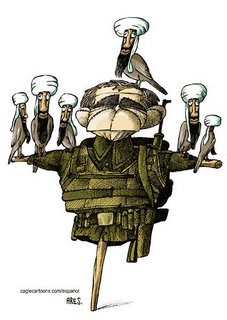 An Important Article
An Important Articleby Ali Al-Fadhily and Dahr Jamail
"BAGHDAD -
Death squads from the Ministry of Interior posing as Iraqi police are killing more people than ever in the capital, emerging evidence shows.
The death toll is high - in all 1,536 bodies were brought to the Baghdad morgue in September. The health ministry announced last month that it will build two new morgues in Baghdad to take their capacity to 250 bodies a day.
Many fear a government hand in more killings to come. The U.S. military has revealed that the 8th Iraqi Police Unit was responsible for the Oct. 1 kidnapping of 26 Sunni food factory workers in the Amil quarter in southwest Baghdad. The bodies of ten of them were later found in Abu Chir neighbourhood in the capital.
But sections of the ministry appear responsible for the abductions and killing.
Ministry of Interior vehicles were used for the kidnapping in this case, and most men conducting the raid wore Iraqi police uniforms, except for a few who
wore black death squad 'uniforms', witnesses told IPS.
"It is for sure that they did it," one of the victim's neighbours told IPS on condition of anonymity. "The tortured bodies were found the second day. They came in their official police cars; it is not the first time that they did something like this. They do it all over Baghdad, and we hope they will get proper punishment this time."
Men of the police unit meanwhile do not face imminent punishment. "They are going to be
rehabilitated and brought back to service," director-general of the Iraqi police Adnan Thabit told IPS.
The Iraqi Islamic Party, the largest Sunni party,
blamed militias with ties to the government and the U.S. military.
"The Iraqi Islamic Party asks how could 26 people, women among them, have been transported from Amil to Abu Chir through all those Iraqi and U.S. army checkpoints and patrols," it said in a statement.
General Yassin al-Dulaimi, deputy minister for the interior, has said on Iraqi television several times that death squads are composed mainly of Iraqi police and army units. His comments reflect differing allegiance and agendas even within the Shia bloc.
General Dulaimi has been trying for long to expose the organised criminal gangs that have been
controlling the ministry since its formation - a formation that was overseen by U.S. authorities.
Dulaimi says he does not believe that the Shia Badr organisation, a large, well-armed and funded militia, has complete control over his ministry. But most residents of Baghdad believe that Badr has complete control over the Baghdad Order Maintenance police force, and use this force to carry out sectarian murders. This force is one of several official security teams in Baghdad.
The force is led by Mehdi al-Gharrawi, who also led similar security units during the U.S.- led attack on Fallujah in November 2004. "
All criminals who survived the Fallujah crisis after committing genocide and other war crimes were granted higher ranks," Major Amir Jassim from the ministry of defence told IPS. "I and many of my colleagues were not rewarded because we disobeyed orders to set fire to people's houses (in Fallujah) after others looted them."
Jassim said the looting and burning of homes in Fallujah during the November siege was ordered from the ministries of interior and defence.
"
Now they want to do the same things they did in Fallujah in all Sunni areas so that they ignite a civil war in Iraq," said Jassim, referring to the Shia-dominated ministries. "
A civil war is the only guarantee for them to stay in power, looting such incredible amounts of money."
Another official with the ministry of defence, Muntather al-Samarraii, told IPS that
both Iran and "collaborators" within the Ministry of Interior are to blame for the widespread sectarian killings..
"I have lists of thousands of corruption cases from within my ministry, and other files to expose to the world," he said, "But the world is not listening. When it does, I am afraid it is going to be too late."
A police officer in Samarraii's office, speaking on condition of anonymity, told IPS that he believed that murderers would not be punished for their crimes.
"They will reward them, believe me, and give them higher ranks," he said. "This is a country that will never stand back on its feet as long as these killers are in power. And the Americans are supporting them by allowing their convoys to move during curfew hours."
While there is little evidence of direct U.S. involvement, questions have arisen over what the U.S. forces have done - or not done - to encourage such killings.
A UN human rights report released September last year
held interior ministry forces responsible for an organised campaign of detentions,
torture and killings. It reported that special police commando units accused of carrying out the killings were recruited
from Shia Badr and Mehdi militias, and trained by U.S. forces. Retired Col. James Steele, who served as advisor on Iraqi security forces to then U.S. Ambassador John Negroponte supervised the training of these forces.
Steele was
commander of the U.S. military advisor group in El Salvador 1984-86, while Negroponte was U.S. ambassador to nearby Honduras 1981-85. Negroponte was accused of widespread human rights violations by the Honduras Commission on Human Rights in 1994. The Commission reported the torture and disappearance of at least 184 political workers.
The violations Negroponte oversaw in Honduras were carried out by operatives trained by the CIA, according to a CIA working group set up in 1996 to look into the U.S. role in Honduras.
The CIA records document that his "special intelligence units," better known as "death squads," comprised CIA-trained Honduran armed units which kidnapped, tortured and killed thousands of people suspected of supporting leftist guerrillas."




























